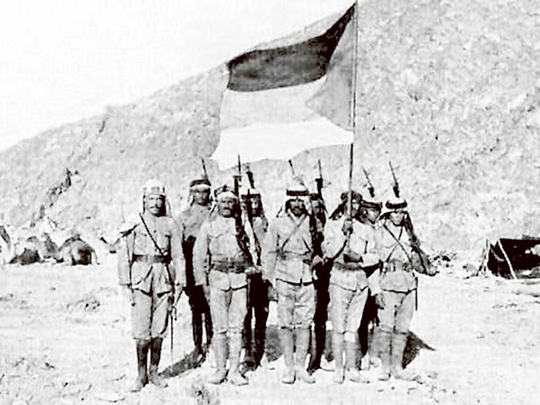Unleashing the Flames of Freedom: The Great Arab Revolt Against the Ottoman Turks
On June 10th, 1916, a momentous event unfolded in the Arab world—the commencement of the Great Arab Revolt against the ruling Ottoman Turks. This revolt would reshape the region's destiny and become a symbol of Arab nationalism and the pursuit of freedom. The Arab people, driven by a long-standing discontent with Ottoman rule, rose up with determination and courage to reclaim their sovereignty. Let us journey through history as we explore the captivating tale of the Great Arab Revolt and the remarkable events that unfolded during this transformative period.
Roots of Discontent: Arab Nationalism and Ottoman Rule
 |
| Arab discontent within the Ottoman Empire |
In addition to Eugene Rogan's book "The Arabs: A History," another valuable source to gain insights into this topic is "A History of the Arab Peoples" by Albert Hourani. Hourani explores the historical context and factors contributing to Arab nationalist sentiment against Ottoman rule. The book comprehensively analyses the complex dynamics within the Ottoman Empire and the Arab world during that period.
Lawrence of Arabia: A Pivotal Figure in the Revolt
 |
| TE Lawrence |
T.E. Lawrence, popularly known as Lawrence of Arabia, played a pivotal role in the success of the Great Arab Revolt. Lawrence's deep admiration for Arab culture and commitment to the Arab cause made him a crucial figure in the revolt. His extensive knowledge of the region gained through his archaeological expeditions and relationships with Arab leaders, allowed him to establish trust and rapport with key figures in the Arab community.
Lawrence's "Seven Pillars of Wisdom: A Triumph" provides valuable firsthand insights into his experiences during the Great Arab Revolt. The book delves into his interactions with Arab leaders, the challenges faced by the Arab forces, and the strategic decisions made to achieve their objectives. Lawrence's personal narrative offers a unique perspective on the motivations, struggles, and triumphs of the Arab revolt against the Ottoman Turks.
Unity in Diversity: Consolidating Arab Forces
One of the remarkable aspects of the Great Arab Revolt was forming a unified front among diverse Arab tribes. Arab leaders, including Sherif Hussein bin Ali of Mecca, his sons Faisal and Abdullah, and other influential figures, worked tirelessly to bridge religious, ethnic, and social divisions to achieve a common goal.
Philip Khoury's book "The Great Syrian Revolt and the Rise of Arab Nationalism" comprehensively examines the revolt and sheds light on the unity among diverse Arab tribes. Khoury explores the complex dynamics of Arab tribal societies and how the revolt brought these disparate groups together under a standard banner. The book also delves into the challenges faced by Arab leaders in maintaining unity and overcoming internal divisions to fight against the Ottoman rule.
The Battle for Aqaba: A Daring Triumph
The Battle for Aqaba was one of the most daring and strategically significant campaigns of the Great Arab Revolt. Lawrence, alongside Arab forces, launched a surprise attack on the heavily fortified port city of Aqaba, located on the Red Sea. The successful capture of Aqaba disrupted Ottoman supply lines and provided the Arab forces with a vital sea route for moving troops and supplies.
 |
| Aqaba |
To gain a comprehensive understanding of the Battle for Aqaba, "Lawrence in Arabia: War, Deceit, Imperial Folly and the Making of the Modern Middle East" by Scott Anderson is a recommended source. The book delves into the campaign details, the tactical decisions made by Lawrence and the Arab forces, and the significant impact of the victory in Aqaba on the overall outcome of the Great Arab Revolt.
The Capture of Damascus: Liberation and Independence
 |
| The Capture of Damascus |
After years of relentless fighting and successful military campaigns, the Arab forces, under the leadership of Faisal, achieved their ultimate objective: the liberation of Damascus. On October 1st, 1918, the iconic city, with its rich history and cultural significance, fell to the Arab armies. This victory marked the end of Ottoman rule in the region and laid the foundation for establishing independent Arab states.
To gain further insights into the historical significance of the capture of Damascus, "A Peace to End All Peace: The Fall of the Ottoman Empire and the Creation of the Modern Middle East" by David Fromkin is an excellent source. The book examines the events leading up to the capture of Damascus and the subsequent peace negotiations that shaped the modern Middle East. It provides a comprehensive analysis of the political, social, and cultural dynamics that influenced the establishment of independent Arab states in the aftermath of the Great Arab Revolt.
Conclusion:
The Great Arab Revolt is a testament to the resilience, determination, and unity of the Arab people in their struggle for freedom and self-determination. Its impact on the course of history and the shaping of the modern Middle East cannot be overstated. The heroes of the revolt, including Lawrence of Arabia and the Arab leaders, left an indelible legacy that continues to inspire generations striving for liberty and justice in the face of oppression.By examining historical records, scholarly works, and firsthand accounts, such as Eugene Rogan's "The Arabs: A History" and Albert Hourani's "A History of the Arab Peoples," we can better understand this transformative chapter in Arab history. Through T.E. Lawrence's "Seven Pillars of Wisdom: A Triumph" and Scott Anderson's "Lawrence in Arabia," we can explore the pivotal role played by Lawrence and the daring campaigns of the Arab forces. Additionally, Philip Khoury's "The Great Syrian Revolt and the Rise of Arab Nationalism" and David Fromkin's "A Peace to End All Peace" offer valuable insights into the unity among diverse Arab tribes and the ultimate liberation of Damascus.
Comments
Post a Comment